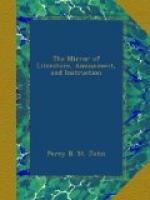[1] We frequently hear of people being muscled;
and it is generally
supposed that the mischief
is produced by some specifically poisonous
quality in the fish.
I have seen many cases, but I could discover
nothing to confirm this popular
opinion. In some instances, only one
of a family has been affected,
while all partook of the same muscles.
I have known exactly the same
symptoms produced by pork, lobsters, and
other shell-fish, and can
attribute them to nothing more than an
aggravated state of indigestion.
A leading rule in diet, is never to overload the stomach; indeed, restriction as to quantity is far more important than any rule as to quality. It is bad, at all times, to distend the stomach too much; for it is a rule in the animal economy, that if any of the muscular cavities, as the stomach, heart, bowels, or bladder, be too much distended, their tone is weakened, and their powers considerably impaired.
The consideration of diet might be rendered very simple, if people would but make it so; but from the volumes which have been recently written on diet and digestion, we might gather the alarming information that nearly every thing we eat is pernicious. Far be it from me to adopt such a discouraging theory. My object is rather to point out what is good, than to stigmatize what is bad—to afford the patient, if I can, the means of comfort and enjoyment, and not to tell him of his sufferings, or of the means of increasing them.
To “eat a little and often,” is a rule frequently followed, because it is in accordance with our feelings; but it is a very bad rule, and fraught with infinite mischief. Before the food is half digested, the irritable nerves of the upper part of the stomach will produce a sensation of “craving;” but, it is sufficiently evident that, to satisfy this “craving,” by taking food, is only to obtain a temporary relief, and not always even that, at the expense of subsequent suffering. There can be no wisdom in putting more food into the stomach than it can possibly digest; and, as all regularity is most conducive to health, it is better that the food should be taken at stated periods. I do not by any means interdict the use of meat; on the contrary, fresh meat, especially beef and mutton, affords great nutriment in a small compass. “Remember,” says Dr. Kitchiner, “that an ounce of beef contains the essence of many pounds of hay, turnips, and other vegetables;” and, we should bear in mind, also, that no meat arrives at perfection that is not full-grown. Beef and mutton are consequently better than veal or lamb, or “nice young pork.” To these such vegetables may be added, as are easy of digestion, and such as usually “agree” with the individual. If, however, the stomach and bowels be very irritable, and their powers much impaired—if the tongue be dry, and its edges more than commonly red, vegetable diet ought




